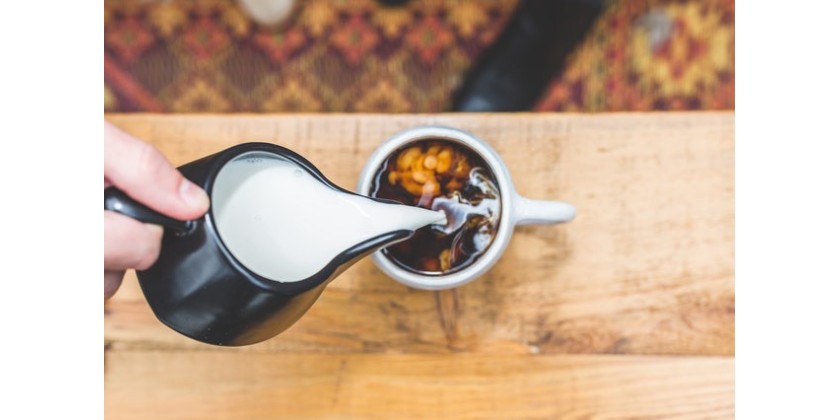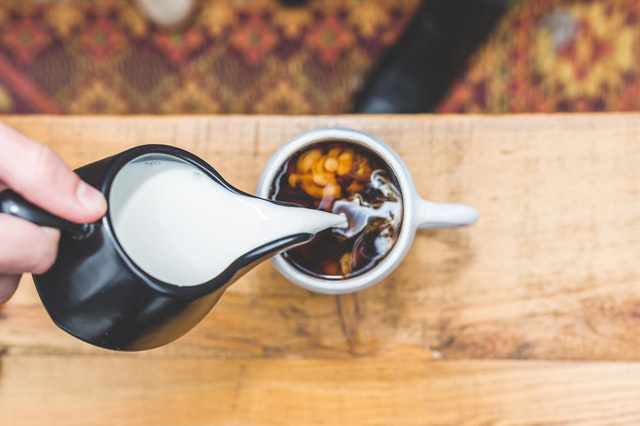
To add or not to add?
When talking about tea with milk, there are three types of tea drinkers.
- those for whom the only way to drink tea is with a splash of milk – and this is unnegotiable,
- those who would never, under any circumstance, add milk to any tea,
- and those in between.
If you are in between, you may ask yourself the question – to add or not to add?
What are the benefits or disadvantages of adding milk to tea?
Top reasons FOR adding milk to tea
1. Milk may improve the flavor and texture of tea
Is tea better with milk? Many teas are. Milk can be a quick fix for many tea flavor problems. It may add depth and flavor to teas that are not as nice as you have expected, too astringent, or over-brewed. Also, if you prefer coffee to tea, but would still like to make a switch, you can try making a creamy tea latte – it’s a perfect alternative to your usual morning routine.
2. Milk may lower the temperature of tea
Another significant benefit of adding cold milk to tea is to cool it down faster – especially if you are in a rush. Morning blends taste especially nice with a dash of milk. In fact, the story goes that the habit of adding milk to tea was born to prevent gentle cups of cracking in contact with hot tea. Don’t add too much though – a splash or two will be enough.
3. Milk may neutralize oxalates in tea
The word oxalate is likely not a part of your daily vocabulary, but if you suffer from kidney problems, you may be more than familiar with its meaning. Oxalates are compounds in food that may contribute to forming kidney stones. Tea may be high in oxalate, but studies showed that adding milk may neutralize them [1].

Top reasons NOT to add milk to tea
1. Milk may weaken the flavor of tea
Usually, tea will be weaker than coffee, not only in caffeine, but in flavor too. Adding too much milk could dilute the flavor. The best tea types to have with milk are stronger black teas, such as Assam or Kenyan teas or flavored teas with creamy notes. Stronger teas taste better with full fat milk, while weaker teas may go well with plant-based milk alternatives. Also, choose either a neutral milk like cow's milk, or plant-based oat or cashew milk, or try to match the tea notes with milk notes.
2. Milk may influence the antioxidant capacity of tea
Although there’s a lot of debate going on around this question, studies suggest that milk may reduce the antioxidant capacity of tea. However, not all types of milk will have the same effect. Interestingly, skimmed cow’s milk may reduce the antioxidant capacity more than semi-skimmed or full fat milk. [2] But what if you still want to enjoy tea with milk? Soy milk may be an excellent alternative – in fact, it may even increase the antioxidant capacity [3].
3. Milk may add more calories
All types of milk contain calories. The most calorie rich milk is full fat cow’s milk and sweetened full fat plant based alternatives. For example, 10 ml of full fat milk will add about 15 calories, while a semi-skimmed will add only about 5. Most plant based milk alternatives will have ½ to 2/3 the number of calories of a full fat cows milk, but some may contain less than 2 calories in 10 ml.
To add or not to add?
Certainly, both adding milk and drinking tea near have its own benefits. While a cup of tea with milk is unlikely to cause serious damage or provide extraordinary benefits, it’s good to pay attention to how it may influence the flavor profile and texture of your tea.
Read more: The most popular types of milk for tea
Disclaimer: This article is for informational purposes only. Always consult your doctor if you suffer from any health issues and never use tea or supplements for self-treatment.
Sources:
[1] https://www.nature.com/articles/1601572



Leave a Reply Cancel Reply